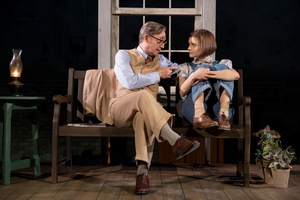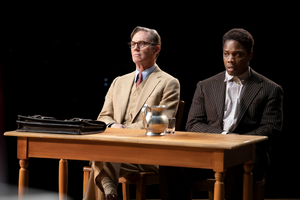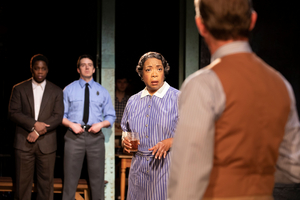Review: TO KILL A MOCKINGBIRD Brings to Life American Classic at James M. Nederlander Theatre
This gripping American Classic is the most important play you can see right now

Harper Lee's To Kill a Mockingbird is like no other work of American literature. Although primarily focused on racial prejudice and injustice, the way it beautifully intertwines complicated realities about poverty, dysfunctional families and growing up in a broken world has earned itself a place in every classroom in every high school in the country. This touring production brought to life by Aaron Sorkin brings home a story that is so central to our culture and history; truly a must-see for anyone who cares to understand more about the best- and worst- of America.
At times narrating and at other times serving as the comedic relief, the kids Scout, Jem, and Dill kept the story moving. Melanie Moore delivered a spunky, curious, and ultimately sweet Scout who just wants to be included in the boys' misadventures. The primarily narrator of the three, Moore precociously explained events in only the way a child can (though perhaps heavy-handed on the Southern twang compared to her fellow castmates). You could hear a pin drop in the theatre at the end of Act I when Scout spotted Mr. Cunningham outside the prison- this was just one of many examples where Moore held the audience captive in her exquisite performance.
Wrestling the line between boyhood and manhood, Justin Mark portrayed Jem. Mark's delivery of this earnest character was utterly charming, as he showed both determination to make Atticus proud, and yet stayed true to his own defiant nature in standing up for his family. Steven Lee Johnson played the lovable Dill Harris, teaming up with Jem in his hijinks and eager to share lessons he's learned in many books he has under his belt. Johnson's winsome performance completely won over the audience multiple times throughout the show, his innocent vulnerability endearing himself to one and all.
 Whether you know him from Meet the Waltons, Billions, or any of his many impressive credits, Richard Thomas stole the show as Atticus Finch. Thomas' ability to show us the unadulterated virtue that makes up this beloved character was nothing short of inspiring. Just when you started to think this unnaturally disciplined man is incapable of rage is when Thomas surprised you the most. When he ultimately reached his breaking point, one could not look away from the volatile scenes that would unfold. Both inside the courtroom and at home, Thomas' Atticus reminded us of our duty to family, community, and each other.
Whether you know him from Meet the Waltons, Billions, or any of his many impressive credits, Richard Thomas stole the show as Atticus Finch. Thomas' ability to show us the unadulterated virtue that makes up this beloved character was nothing short of inspiring. Just when you started to think this unnaturally disciplined man is incapable of rage is when Thomas surprised you the most. When he ultimately reached his breaking point, one could not look away from the volatile scenes that would unfold. Both inside the courtroom and at home, Thomas' Atticus reminded us of our duty to family, community, and each other.
 The most thought-provoking dialogue of the performance was that between Atticus and Calpurnia (Jacqueline Williams), the Finch family's maid and cook. When Atticus proclaimed, "We should," Calpurnia responded with, "Why should we?" This rich back-and-forth gave so much agency to Cal- more than I remembered from the book- and gives one pause as you consider yourself "crawling around" in both the skins of both Atticus and Calpurnia. William's performance was imbued with confidence and an unshakeable dignity that was truly spellbinding.
The most thought-provoking dialogue of the performance was that between Atticus and Calpurnia (Jacqueline Williams), the Finch family's maid and cook. When Atticus proclaimed, "We should," Calpurnia responded with, "Why should we?" This rich back-and-forth gave so much agency to Cal- more than I remembered from the book- and gives one pause as you consider yourself "crawling around" in both the skins of both Atticus and Calpurnia. William's performance was imbued with confidence and an unshakeable dignity that was truly spellbinding.
One of the most gripping parts of this play was its many explosive courtroom scenes (though perhaps "incendiary" or "downright combustible" would be better descriptors for how intense these scenes were. Most notably, Joey Collins in the role of Bob Ewell had the most convincing, outrageous anger I have ever witnessed on the stage (I believe I stopped breathing for a solid minute during the first of his many outbursts). Collins perfectly encapsulated this slimy, unsavory, and downright wicked man so perfectly.
Matching Bob Ewell's energy was Ariana Gayle Stucki in the role of his daughter, Mayella. If there was a contest for looking wretched, Stucki would win in a landslide. Stucki's expertly captured the fear, shame, and pathetic nature of this complicated young woman.
Giving a performance that was equally funny as it was heartfelt, Anthony Natale nailed the role of Link Deas. As a deaf performer, Natale signed all his lines as his fellow castmates took turns creatively interpreting. I found both the combination of this casting decision and Natale's excellent performance to be utterly brilliant- Indeed, Natale's scene with the children was the first one in which the tears began rolling down my face. Bravo to Natale and director Bartlett Sher for excellence in performance and inclusivity!
Finally, the loved and hated defendant at the center of the courtroom drama- Yaegel T. Welch's Tom Robinson. Undeniably persecuted, beaten down by the system, and hopeful despite his circumstances, Welch embodied this tortured character. Despite being enshrouded by fear and uncertainly for much of the show, the way Welch's Robinson stayed true to himself in the final courtroom scene had each audience member on the edge of their seat. Welch's portrayal gave a powerful voice to so many people trapped in an unjust system.
One of my favorite elements of this show was how smooth the scene transitions were. Scenic designer Miriam Buether ensured a set that was uncomplicated but perfectly effective, its simplicity balancing out the heavy subject matter. Scene changes occurred so fluidly that you hardly realized they were happening- I particularly loved when the roof of the Finch house would descend, the porch steps gliding in underneath in one synchronized movement.
Each of the costumes in this performance worked well for the characters and the time period of the 1930s. The children's simple play clothes, Atticus' cream-colored suit, and the women's smartly fitted dresses all served to transport one to a certain time and place in the deep south. I would be remiss if I skipped over mentioning how brilliant Scout's ham costume was- this seemingly small element truly delighted the attendees.
It's impossible to see To Kill a Mockingbird and not be reminded of how relevant of a play it is in today's world. Racial prejudice and a flawed justice system still haunt people like Tom Robinson and their families nearly 60 years after this important text was published. Despite this sad reality, there are new Atticus Finches to be found (such as Just Mercy's Bryan Stevenson) who will continue to answer the call to "beat the drum for justice." Whether you read the book as a teenager or you arrived in this country only yesterday, To Kill a Mockingbird is the most important play you could see right now- you won't regret it.
To Kill a Mockingbird runs through May 29 at the James M Nederlander Theatre. Tickets can be purchased here.
Reader Reviews

Videos

